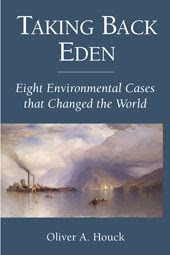During the last two weeks New Zealand and India have granted legal rights to rivers. On March 15 legislation was adopted by the New Zealand parliament that grants the Whanganui River the same legal rights as humans. The provision is part of legislation settling claims against the New Zealand government by the indigenous iwi people. Under the legislation two guardians will be appointed to represent the river -- one selected by the iwi and the other by the Crown. On March 20 the high court in Uttarakhand state in India, citing the New Zealand precedent, granted legal personality to the Ganges and Yamuna Rivers. The judges declared that the rivers and their tributaries are “legal and living entities having the status of a legal person with all corresponding rights, duties and liabilities.” The court appointed the head of the National Mission for a Clean Ganges and the state’s advocate general and chief secretary to represent the rivers in legal proceedings. The decision is the product of public interest litigation brought against the states of Uttarakhand and Uttar Pradesh for failure to cooperate with federal government efforts to protect the Ganges.
March 22 was celebrated as World Water Day and the start of China Water Week. The United Nations Children’s Fund reported that 1.8 billion people still use contaminated drinking water. The Sustainable Development Goals adopted by the UN in 2015 include ensuring that everyone has access to safe drinking water by 2030. On March 20 China’s Ministry of Environmental Protection reported that the nation had met its goals for improving water quality in 2016 with 67.8% of the country’s 1,940 monitoring stations reporting water quality within the top three tiers of the nation’s rating system. On March 22 China’s State Oceanic Administration reported that 95% of the nation’s marine waters met the nation’s highest tier of the country’s four-tier system for assessing the quality of marine waters. China is in the process of having its provinces establish “river chiefs” with responsibility for preventing water pollution in watersheds
On March 18 Beijing officials closed the last remaining coal-fired power plant operating in the city. The Huangneng Beijing Thermal Power Plant, owned by China Huaneng Group, opened in June 1999 in the eastern suburbs of Beijing. It is the last of four coal-fired power plants in Beijing to be retired. The other three were retired in 2014 and 2015. Together they burned more than 8.5 million tons of coal annually. With the plant’s closure, Beijing became the first large city in mainland China to no longer have coal-fired power plants, though it still imports some electricity generated by coal-fired power plants in Inner Mongolia and Hebei provinces. Capital Retires its Last Coal-Fired Power Station, China Daily, March 20, 2017, at A7.
On March 24, U.S. President Donald Trump granted approval for construction of the Keystone XL pipeline. Trump’s decision reverses former President Obama’s November 2015 denial of a permit for the pipeline to cross the Canadian border. The pipeline still needs approval from Nebraska authorities, something that Trump promised to help expedite.
The University of Maryland Carey School of Law has announced a successor to Professor Jane Barrett, director of Maryland’s Environmental Law Clinic. EPA attorney Seema Kakade will be the new director of the clinic beginning on July 1, 2017, when Professor Barrett retires. Professor Kakade is an expert on air pollution issues who helped handle the prosecution of Volkswagen for its deceptive emissions-testing software. She also formerly served as director of the Environmental Law Institute’s India program.
I have been in Shanghai for the past week while on spring break. I made a presentation at NYU Shanghai on March 21 of some of the highlights of environmental law films my students have made over the years. Two of my students (Chris Remavege and Taylor Lilley), who made the top films in the class last fall then presented their films, “Glass Half Full: Sustainable Vineyards” (about how wineries are trying to reduce their carbon footprints) and “A World in Retreat” (about adapation to sea level rise). On Wednesday I gave a lecture on international environmental law at Shanghai Maritime University. On Thursday I was part of a panel discussion at NYU Shanghai on careers in environmental law and I gave a presentation on the Trump administration and environmental law to students from Shanghai Jiatong University’s Ko Guan School of Law.
On the way to China I stopped in San Diego to attend World Baseball Classic games on March 17 & 18. I saw the U.S. narrowly lose to Puerto Rico and then defeat the Dominican Republic in the game that advanced the U.S. team to the semifinals. After defeating Japan in the semifinals on March 21, the U.S. won the championship by defeating Puerto Rico on March 22. This is the first time the U.S. has won the World Baseball Classic since it was started in 2006. It is now played every four years.
















